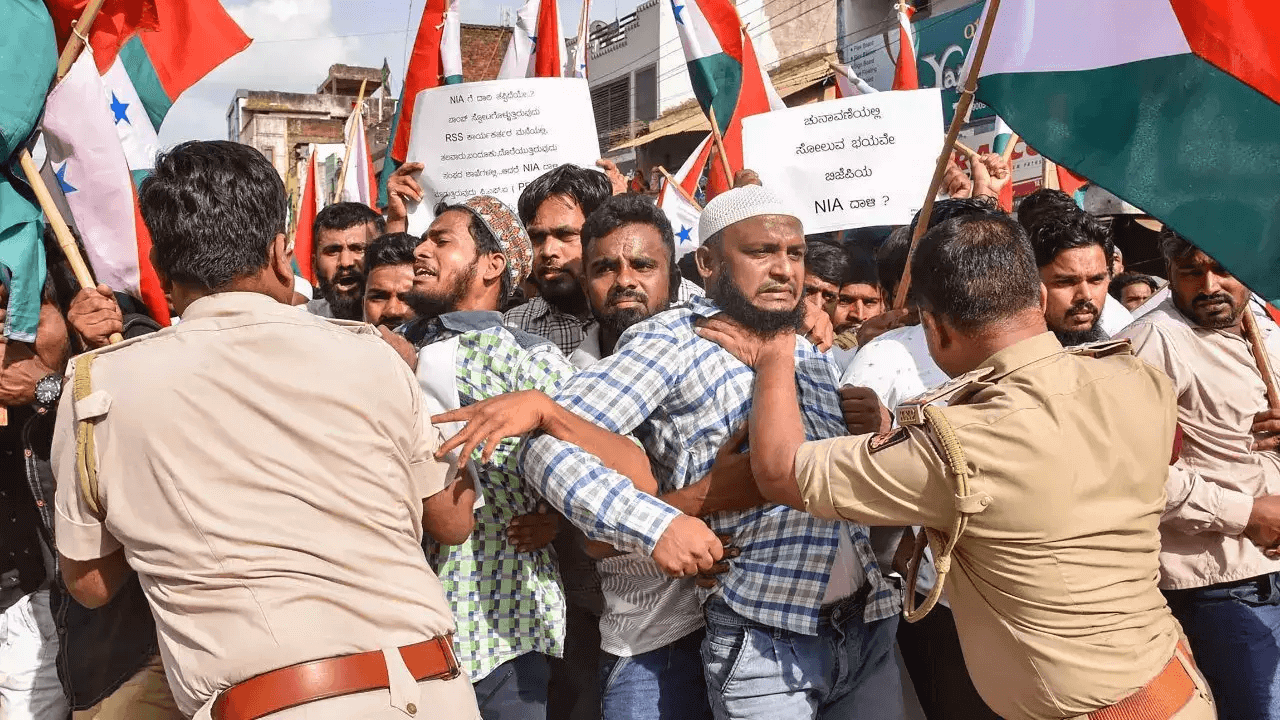The Indian government on Wednesday banned the Muslim group Popular Front of India (PFI), along with its affiliates, for five years over national security concerns, citing terrorism, terror financing, “gruesome killings, disregarding the constitutional set up of the country, [and] disturbing public order.”
Saying that the PFI has acted in a manner that is “prejudicial to the integrity, security and sovereignty of the country,” the Ministry of Home Affairs (MHA) said it was “necessary to curb the nefarious activities” of the PFI and its affiliates, including the Rehab India Foundation (RIF), Campus Front of India (CFI), All India Imams Council (AIIC), National Confederation of Human Rights Organization (NCHRO), National Women’s Front, Junior Front, Empower India Foundation, and Rehab Foundation, Kerala.
To this end, it labelled them as ‘Unlawful Associations’ under the Unlawful Activities (Prevention) Act, 1967.
Govt has banned for 5 years:
— Anshul Saxena (@AskAnshul) September 28, 2022
1. PFI
2. Rehab India Foundation
3. Campus Front
4. National Women's Front
5. All India Imams Council
6. Junior Front
7. Empower India Foundation
8. Rehab Foundation Kerala
9. National Confederation of Human Rights Organization.
All linked to PFI.
A Gazette notification by the MHA said that although the PFI and its fronts “operate openly as (a) socio-economic, educational, and political organisation,” they have been “pursuing a secret agenda to radicalise a particular section of the society working towards undermining the concept of democracy and show sheer disrespect towards the constitutional authority and constitutional set up of the country.”
It further reasoned that the PFI and its associates “have been involved in the violent terrorist activities with an intent to create a reign of terror in the country, thereby endangering the security and public order of the state.” It added that the outfit’s activities “disrespect and disregard the constitutional authority and sovereignty of the state,” which prompted “immediate and prompt action” by the MHA. According to the government, the group maintains links with banned Islamist groups such as the Students Islamic Movement of India (Simi) and the Jamat-ul-Mujahideen Bangladesh (JMB), as well as the Islamic State of Iraq and Syria (ISIS).
In fact, it claimed that the PFI has been involved in at least ten murders across three southern states (Tamil Nadu, Karnataka, and Kerala) and that some PFI activists have even joined ISIS and taken part in terrorist activities in Syria, Iraq, and Afghanistan.
After the Central govt yesterday declared #PFI and its associates, affiliates and/or fronts as an unlawful association for 5 years, all social media accounts - Twitter, Facebook, Instagram & YouTube, of the organization have been banned in India. pic.twitter.com/zlZMpm0YQu
— Priti Gandhi - प्रीति गांधी (@MrsGandhi) September 29, 2022
The ban comes amid an ongoing government crackdown on the organisation. The National Investigation Agency (NIA), along with the Enforcement Directorate (ED) and state agencies, carried out two separate raids on the group’s offices across several states (Uttar Pradesh, Assam, Bihar, Tamil Nadu, Karnataka, Telangana, and Andhra Pradesh) on 22 and 27 September and arrested nearly 250 of its members, accusing them of engaging “anti-national activities” and organising training camps to “commit terrorist acts.” The investigation agency reported seizing “incriminating documents, cash, sharp-edged weapons, and a large number of digital devices.”
The NIA also cited violent crimes by the group over the years, including chopping off the hand of a college professor, killing those associated with other religious groups, supporting ISIS, and destroying property.
The PFI’s counsel, Mohammed Tahir, has denied the allegations, stating that the government had failed to present evidence of the group receiving money from external sources, funding terror activities in India by organising riots in cities, and attacks on Hindu organisations and its leaders. Following the NIA’s first raid, the PFI said it was being subjected to a “witch hunt” and accused the NIA of making baseless claims to create “an atmosphere of terror.” It has also held several nationwide protests against the government raids in recent days.
Pakistan's love & sympathies for PFI proved that banning them is right. #PFIExposed pic.twitter.com/oaIx74EwI2
— Harsh Chaturvedi BJP (@harshcha) September 28, 2022
The move has also been met with criticism by opponents of Prime Minister Narendra Modi, who claim that his Bharatiya Janata Party’s landslide reelection in 2019 emboldened the home ministry to declare individuals as terrorists based solely on accusations. Muslims comprise more than 14% of India’s nearly 1.4 billion population and communal tensions between Muslims and Hindus have been rising, with critics attributing this to the ruling government’s alleged Hindu nationalist agenda.
The PFI, formed back in 2006, claims that it is a “non-governmental social organisation whose stated objective is to work for the poor and disadvantaged people in the country and to oppose oppression and exploitation.” It is active in 20 states and has hundreds of thousands of members, and says its goal is an “egalitarian society where everyone enjoys freedom, justice and a sense of security.”
Ban on PFI and Associates is Part of Undeclared Emergency by the BJP regime#PFI @PFIOfficial @MKFaisy pic.twitter.com/WtVvnMD2zJ
— SDPI (@sdpofindia) September 28, 2022
However, it gained notoriety back in 2010 after TJ Joseph, a college professor in Kerala who was accused of asking derogatory questions about Prophet Muhammad, had his hand chopped off by PFI activists. The man subsequently lost his job and his wife committed suicide.
Then, in 2018, PFI activists in Kerala were accused of stabbing a leader of the left-wing Students Federation of India to death.
More recently, in June, a Hindu tailor in Udaipur, Kanhaiya Lal, was beheaded by two Muslim men with alleged links to the group.

